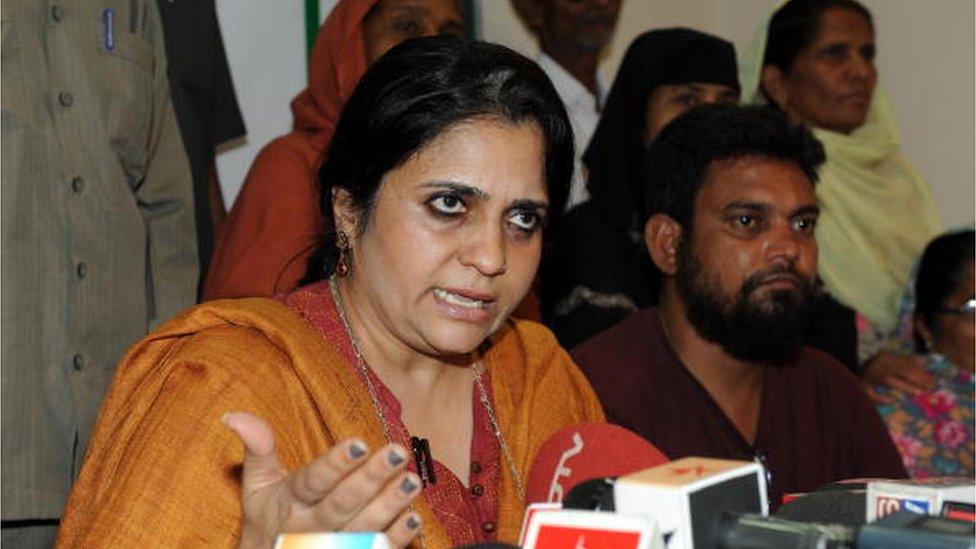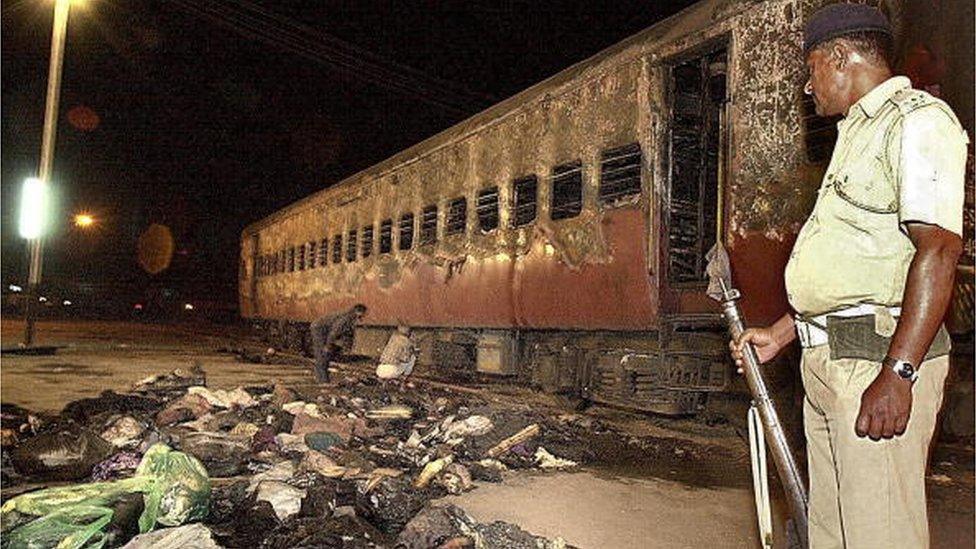Teesta Setalvad: India activist gets bail in 2002 Gujarat riots case
- Published

Teesta Setalvad has long fought for victims of the deadly 2002 riots in Gujarat state
India's Supreme Court has granted bail to a leading activist, two months after she was arrested on allegations she faked documents about riots in 2002.
Teesta Setalvad has long fought for victims of the violence in Gujarat state and accuses PM Narendra Modi, who was then chief minister, of complicity.
She was arrested in June on charges of "forgery and fabricating evidence" in a riots case.
Her arrest was widely condemned by global rights groups.
It also sparked protests - with critics accusing Mr Modi and his Hindu nationalist Bharatiya Janata Party (BJP) government of targeting Ms Setalvad for her work.
Since 2003, Ms Setalvad, a human rights lawyer, has been accused in at least seven cases - allegations range from violating India's foreign exchange rules and embezzling funds raised from riot victims to coaching witnesses in the trials.
But investigators were never able to charge her and the courts refused police requests for her custody to question her about five times.
The 2002 riots in Gujarat were among India's worst outbreaks of violence in decades.
More than 1,000 people - mostly Muslims - died in the riots which began after 60 Hindu pilgrims died in a train fire, which was blamed on Muslims, in the town of Godhra.
The state's BJP government and Mr Modi were accused of not doing enough to bring the violence under control - an allegation he has consistently denied.
In June, the Supreme Court cleared him of complicity after ruling that there was no evidence against him.
Two days later, police arrested Ms Setalvad after registering a fresh case of forgery and criminal conspiracy against her.
Ms Setalvad, who denies the allegations against her, approached the Supreme Court for bail after her plea was rejected by a trial court and the Gujarat High Court deferred the matter for a longer period.
On Friday, the Supreme Court said that the high court would still take a call on her bail plea but granted her interim bail so she could be freed.
Who is Teesta Setalvad?
Ms Setalvad runs Citizen for Justice and Peace - a non-profit organisation formed in the aftermath of the 2002 violence to provide legal aid to victims of crimes like religious riots and terrorism.
Since it's inception, the organisation has secured 120 convictions in 68 cases involving nine major riot incidents - a record for convictions for any religious riot in India.
But Ms Setalvad says she has been routinely targeted for her work. Her house and office were raided a number of times, her bank accounts were frozen on many occasions and she was relentlessly vilified and threatened on social media.

The anti-Muslim riots of 2002 began after 60 Hindu pilgrims died in a train fire
She told the BBC's Soutik Biswas in 2015 that she had to spend a lot of her time defending herself.
"Some of the allegations that I siphoned off money meant for riot victims makes my blood boil. This government believes in reviling its critics and paralysing them. Such allegations are despicable."
One of her most high-profile cases has been about a massacre at a Muslim housing complex in the state's main city of Ahmedabad in which a former MP Ehsan Jafri and 68 others were killed by a mob.
In 2013, a trial court in Gujarat ruled that there was not enough evidence to prosecute Mr Modi in connection with the case.
But Ms Setalvad, who's been representing the MP's widow Zakia Jafri, had petitioned the top court seeking a fresh investigation into the "larger conspiracy" behind the violence and had accused the investigators of working to "protect" conspirators.
While dismissing her plea on 24 June, the Supreme Court said that the people who accused Mr Modi of not doing enough had "exploited the emotions of Zakia Jafri" and "kept pursuing the case intriguingly for the last 16 years… to keep the pot boiling, obviously, for ulterior design".
"As a matter of fact, all those involved in such abuse of process need to be in the dock and proceeded within accordance with law," the three-judge bench said.
Two days later, Home Minister Amit Shah, who is a close aide of the prime minister, also accused, external Ms Setalvad of giving baseless information to the police to tarnish Mr Modi's image.
Hours later, she was arrested.
Her arrest set off a wave of outrage, with journalists, activists and opposition politicians calling it the latest attempt by the government to stifle dissent.
Global rights groups such as Human Rights Watch and Amnesty International also condemned her arrest.

Read more India stories from the BBC:

Related topics
- Published29 August 2018
- Published26 February 2020